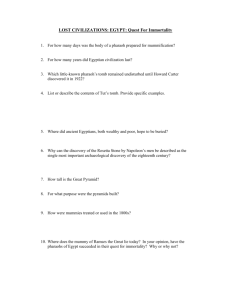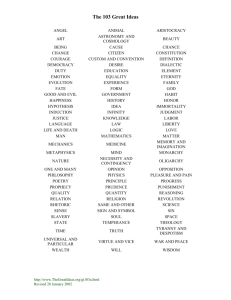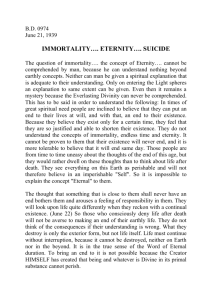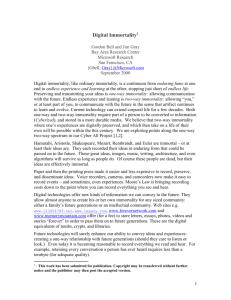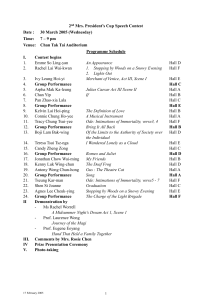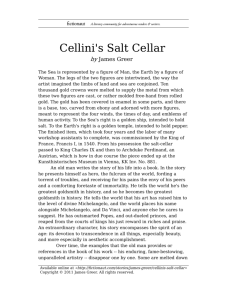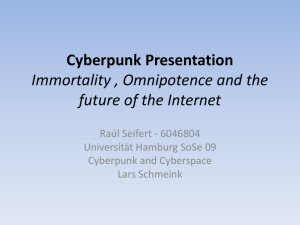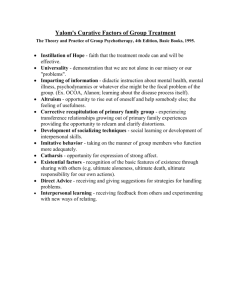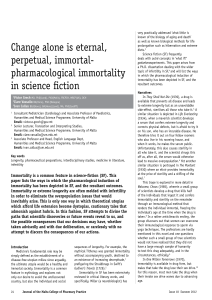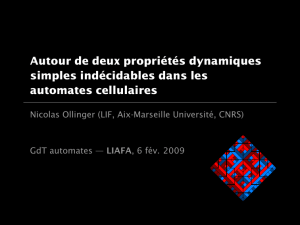1111298084_285931
advertisement
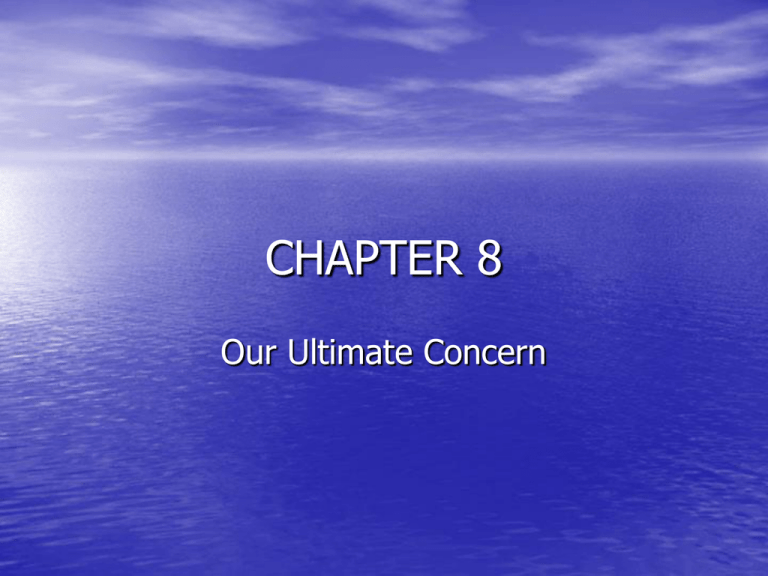
CHAPTER 8 Our Ultimate Concern Nikos Kazantzakis writes: “We have seen the highest circle of spiraling powers. We have named this circle God. We might have given it any other name we wished: Abyss, Mystery, Absolute Darkness, Absolute Light, Matter, Spirit, Ultimate Hope, Ultimate Despair, Silence.” Tennessee Williams writes: “We are all children in a vast kindergarten trying to spell God’s name with the wrong alphabet blocks.” Of Ultimate Concern • This chapter deals with philosophy of religion. It ponders the following: – – – – – – – – Anthropomorphic spirits Spirit possession The function of myth Teleocosmic dramas Apocalyptic interpretations of history Battlefield cosmology The final eschaton Messianic figures Greek Tragedy • • • • Religion is universal Human life is Greek tragedy To exist is to suffer, Buddha For a million years evolution has labored to produce a creature with intelligent awareness. Now this creature, using that awareness, finds that he is trapped in a user-unfriendly predicament – an ontological Prison from which there seems to be no escape. Transformation • Religion is humankind’s response to the bitter truth of the human condition: – – – – – – – We are helpless The universe is uncaring The universe in unjust We are mortal The universe is capricious The universe is meaningless There are no grounds for hope • Doctrine, Dogma, Creed, Theology The Role of Myth • Myth – a story involving the supernatural that is accepted by members of a social group that explains the origin, significance, or meaning of an event. When the story is believed, it become true; and when it become true through belief, it is then called religion. Spirits & Dramas • The Anthropomorphic Spirits • Spirit Possession • Teleocosmic Dramas • Apocalyptic Dramas • The Eschaton – End of Drama All Religion is One • “The highest common factors” • “Divine Ground of Being” • Direct intuitive knowledge • Man is a duality • Singular goal as knowing the eternal essence of being and to identify it with the Divine Ground of all Being Joseph Campbell The Hero with a Thousand Faces “The fundamental themes of mythological thought have remained constant and universal, not only throughout history, but also over the whole extent of mankind’s occupation of the earth.” Reflections… Understanding the more technical usage of the word “myth” is important. What psychological and epistemic function does myth satisfy? Ultimate Reality • This chapter continues the attempt to understand the phenomenon of religion. • Nietzsche, “God is Dead.” • Is “God dead” or on the other side of Merton’s “seven story mountain”? Ultimate Questions • Metaphysical: What is ultimate reality? How many orders of reality exist? Is there a supernatural order of reality? Does God exist? • Epistemological: Can we humans who belong to the natural order know that which belongs to the supernatural order? If so, how? Does God “reveal”? The Problem of Divine Knowledge • • • • • • • • Judeo-Christian God Earth Mothers Zeus and Zoroaster Buddhist myth Mary, Mother of God Xenophanes Philo of Alexandria “Perfect wisdom”/”Perfect being” Arguments for the Existence of God • The Cosmological Argument • The Ontological Argument • The Teleological Argument The Death(s) of God(s) Worldviews have changed. Spirits and demons have died: we now account for human behavior in terms of operant conditioning and motivation. We have seen too many gods; our anthropomorphic habits are too obvious to be brushed aside. God, too, is dead. Thomas Merton The Other Side of Kanchenjunga What Merton gradually came to see is not an uncommon realization for seekers: that experience opens the avenues of communication, whereas belief closes them off; that experience encourages dialogue, whereas belief encourages pronouncement; and that whereas experience leads to empathy and appreciation, commitment to doctrinal formulas produces antipathy and disparagement. Reflections… To the best of your knowledge, and after pondering this chapter, what is the nature of Ultimate Reality? Can it be described in mere human words? Is it material? Is it natural but nonmaterial? Is it personal? Does it take the form of deity? What kinds of human experiences might be interpreted as indicators of the existence and/or nature of this Ultimate Reality? Death/Immortality • Why exactly do we fear the nonbeing of death? • Why do humans universally deny it? • Concepts of immortality • Argument for/against the immortality of the soul • Kubler-Ross’s analysis • Heinlein on personal immortality All Graves are Wrong • Ernest Becker writes: “the idea of death, the fear of it, haunts the human animal like nothing else; it is the mainspring of human activity – activity designed largely to avoid the fatality of death, to overcome it by denying in some way that it is the final destiny of man.” Death is a Nonexperience • Thanatologists – philosophers of the death event • Cessation of consciousness vs. termination of physiological processes • Fear of suffering • Fear of confusion • Fear of nonbeing The Denial of Death • Biological immortality • Social immortality • Moral immortality • Life-cycle immortality • Cryonic suspension, total transplants, regeneration Arguments for Immortality • Rational argument for immortality • Empirical evidence for immortality Arguments Against Immortality • Rational argument against immortality • Empirical evidence against immortality The Future of Death • How we perceive “the problem of death” depends partly upon the attitude options open to us at any particular time and place • Mankind’s general stance toward death has wavered between a stubborn denial and a grudging submission Omar Khayyam “…this life flies” • He was denounced as the “arch- freethinker” of his time and warned to “bridle his tongue” • Time is the enemy • Live for today, but… • “Turn down and empty Glass!” Reflections… • “All graves are wrong when you come right down to it”. How do you respond to the point Bradbury is making after pondering this chapter? Meaning/Existence • What do we really want? • What in the final analysis, drives us and guides us? • What end – if anything – are we striving to accomplish? • Do we truly want what society tells us we want? The Knowledge that Hurts Most • Gibran’s “unbeliever” • Nietzsche’s “Don Juan of the Mind” What Did I Want? • • • • • • • • • • • What am I doing here? Socrates Aristippus Yeshua bar Yoseph Paul of Tarsus Confucius The Buddha Shankara Muhammad John Calvin Friedrich Hegel Existence & the Real: Persistent Confusion • Viktor Frankl • Jean-Paul Sartre • Charles Beard • Bertrand Russell Trivialities • Much modern Western philosophy has contended that there are no real values and that, by a sort of hopeless tour de force, each of us must inject meaning into his own life. • “Fish gasping on the strand” Work, Work…To Kill the Flowers • Halverson • Flowering of man’s awareness • Langdon Jones, The Eye of the Lens The World-Riddle • Each human being tries in his personal, and perhaps desperate, way to make this short life/time meaningful…behind all this is the burden of our consciousness of death… • Is our loneliness eased knowing what we know? Nikos Kazantzakis “I know not if I shall ever anchor” • Three kinds of souls: One kind of soul says “I am a bow in your hands, Lord. Draw me, lest I rot.” A second kind says “Do not overdraw me, Lord. I shall break.” But a third kind says “Overdraw me, Lord, and who cares if I break!” Reflections… • Reflect at length, and with leisure, on the passage from Langdon Jones’s “Eye of the Lens.” • Among several possible meanings, what do you think the author is saying?
